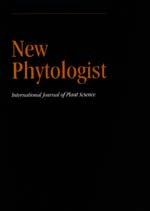Article contents
33P translocation in the thallus of the mat-forming lichen Cladonia portentosa
Published online by Cambridge University Press: 01 February 2000
Abstract
The extent of vertical migration of 33P in thalli of the heathland lichen Cladonia portentosa was investigated under field conditions. 33P-labelled orthophosphate was introduced into the bottom 25 mm of podetia cut to a length of 50 mm from the apices. The distribution of label was scanned using a molecular imager immediately after incubation, and after growing for 8 wk and 6 months. Differences in the relative distribution of label between podetia harvested at the beginning and the end of the experiment showed that there had been a significant migration of 33P upwards out of the labelled 25 mm stratum towards the apex. This was confirmed by statistically significant changes in the median (md) and the 90 percentile of total relative distribution of 33P label. In a control treatment in which label was introduced into the apical 25 mm of podetia, which were then grown inverted (top down), no upward movement of label was detected. By contrast, a statistically significant reduction in the md of the distribution indicated migration downwards towards the thallus apex. The results are consistent with the hypothesis that P is recycled within podetia of mat-forming lichens, migrating from degrading basal regions upwards to the growing apices following a source–sink relationship.
- Type
- Research Article
- Information
- Copyright
- © Trustees of the New Phytologist 2000
- 12
- Cited by


